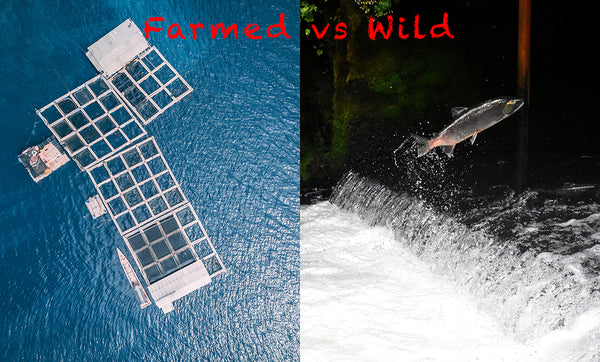Salmon: Wild vs Farmed?

In the debate between whether to eat fish grown and harvested in wild waters or those raised on “farms,” there is little contest. Wild fish are both healthier and more flavorful, and buying from U.S. fisheries supports domestic economies weakened by environmental damage (such as the Exxon Valdez oil spill) and foreign imports.
According to a study published in Science magazine, farmed salmon can carry as many as ten times the level of carcinogenic polychlorinated biphenyls (PCBs) as wild salmon.[1] Much of the problem is due to the kinds of feed given farm-raised fish: recycled beef fat from agricultural slaughterhouses is a common ingredient, and the diets of cattle are often already high in industrial toxins due to environmental and other factors. These PCBs become concentrated with each step up the food chain, leaving the humans who consume the PCB-rich fish at the highest risk.[2] Wild salmon eat primarily smaller fish, such as herring and krill.
Another key difference between wild and farmed salmon is the water in which they live. Farmed salmon mature in pools or pens, where there is seldom a great deal of water disturbance or “turbulence” for them to push against. Wild salmon grow up fighting currents and navigating the force of natural waters. This produces stronger, more robust musculature and, for the consumer, denser and more flavorful fish.
The majority of Atlantic salmon are farmed – over 99%, while more than 80% of salmon coming from the Pacific (primarily Alaskan salmon and Pacific Northwest salmon) are wild-caught.[3]
[1] 1. Hites, R. A. et al. Global assessment of organic contaminants in farmed salmon. Science, 303, 226 - 229, (2004).
[2] Hopkin, M. Study shows farmed salmon contain dangerous levels of toxic chemicals. Nature Magazine, Jan. 9, (2004).
[3] http://en.wikipedia.org/wiki/Salmon - Retrieved 10/1/08.
Photo Credits: Drew Farwell & Hanson Lu

